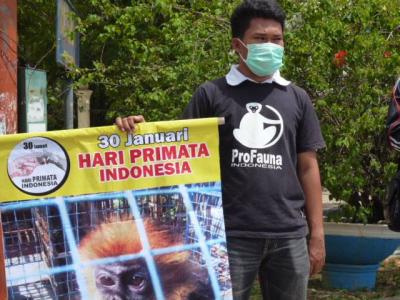Stop Primate Trade in Sulawesi!
KENDARI, SUARAKENDARI.Com- A call for halt to primate trades was voiced by environmental activists in many cities at the celebration of the Indonesian Primate Day. The call was due to the rampant trade, which has become the most dangerous threat faced by Indonesian primates along with habitat loss. More than 95% of the traded primates were captured from the wild. Along the process of capturing and transporting the primates, cruelties are often inevitable. Many of them died in the process.
One of the most traded primates today is the Slow Loris (Nycticebus sp.). Most of the traded Slow Lorises have had their teeth removed by the poachers, to make them look nice and tame. As a nocturnal species (active at night), it become people's favorite pet because during the day they seem so cute and sluggish. In 2013 only, ProFauna noted that there were at least 40 cases of Slow Loris online trade.
There are around 200 primate species in the world, and 40 of them (almost 25%) live in Indonesia. In 2000, the IUCN published a red-list of 25 most endangered primates in the world. From the 25 species, four of them are from Indonesia: Sumatran Orangutan (Pongo abelii), Siau Island tarsier (Tarsius tumpara), Javan Slow Loris (Nycticebus javanicus), and Pig-tailed Langur (Simias cocolor). Those primates will sure be extinct if there is no action to save them.
 The Indonesian Primate Day, celebrated every 30 January, is used by activists as a moment to engage the people of Indonesia in the primate conservation efforts; one of the easiest ways is by not buying primates. Keeping primates as pets at home also opens the possibility of the transmission of zoonotic diseases such as tuberculosis, hepatitis, and herpes. Letting primates live in their natural habitat is the best act for everybody to save the primates and maintain public health.
The Indonesian Primate Day, celebrated every 30 January, is used by activists as a moment to engage the people of Indonesia in the primate conservation efforts; one of the easiest ways is by not buying primates. Keeping primates as pets at home also opens the possibility of the transmission of zoonotic diseases such as tuberculosis, hepatitis, and herpes. Letting primates live in their natural habitat is the best act for everybody to save the primates and maintain public health.
The activists also demanded the government to pay more attention to the trades of protected primate species. According to the law of Indonesia no. 5 of 1990 concerning the Conservation of Living Resources and Its Ecosystem, the trade of protected primates is strongly forbidden and the malefactor are subject to minimum 5 years of prison and IDR 100 million fines.
How about the primates of Sulawesi? Sulawesi is home to 12 species of endemic primates, one example is the tarsier. By local people, the tarsiers are known as "ghost animal" because of its tiny size, wide eyes, and night activities. The tarsiers only weigh 110-120 grams, and 115-120 mm long. This animal can be found in primary and secondary forests, even in plantations close to forests. They live in groups up in the trees or in the bushes, but they do not make nests. They move between trees and communicate with their high-pitched voice.
Beside poaching and trade, the Tarsiers in Sulawesi are also threatened by massive land opening, which are to be converted into large-scale extractive industries, mining, and palm oil plantation. "Stop poaching and trading the Tarsiers! Stop primate trade, and let's save Indonesian forests!" appealed Imanche Rahman.
Original source: Suarakendari.com
